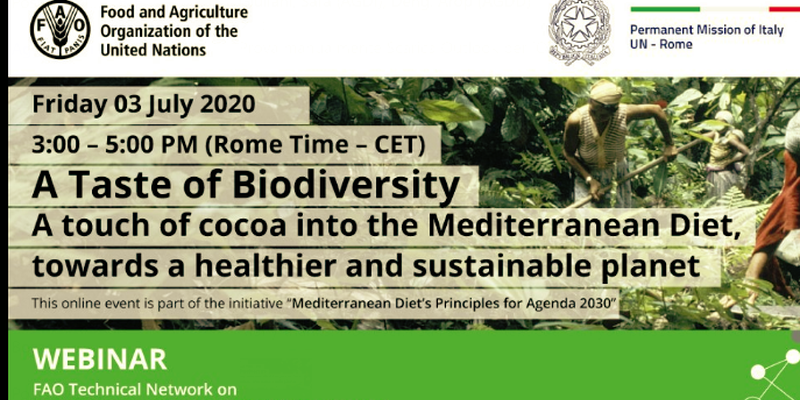IPPC Secretariat participated in high-level webinar on biodiversity
Posted on Fri, 10 Jul 2020, 11:53

Rome, 3 July 2020 - The Permanent Representation of Italy to UN Agencies in Rome, FAO and The Alliance of Bioversity International and CIAT held the fourth webinar under the umbrella of “Mediterranean Diet’s Principles for Agenda 2030”, an initiatives promoting sustainable approaches promoting biodiversity and healthy diets. The third session took place on Friday 3 July 2020 from 15:00 to 17:00 and titled A Taste of Biodiversity - A touch of cocoa into the Mediterranean Diet, towards a healthier and sustainable planet.
Ms Marcela Villarreal, FAO Partnerships Director, chaired the session while H.E. Vincenza Lomonaco, Permanent Representative of Italy to Rome-based UN Agencies, delivered opening remarks and launched the seminar with the projection of the IYPH promotional video. Speakers included Mr Juan Lucas Restrepo, Director-General of the Alliance of Bioversity International and CIAT, Ms Beth Bechdol, FAO Deputy Director-General, and Mr Mario Lubetkin, FAO Assistant Director-General, who provided closing remarks.
The webinar included a section on the International Year of Plant Health (IYPH), delivered by Mr Mirko Montuori, Project Officer of the IPPC Secretariat, as healthy plants are the first ingredient for sustainable and diverse diets as well as a key component towards sustainability. Mr Montuori shared relevant IYPH key messages, discussing some figures indicating that diets are mostly based approximately fifteen edible plants out of the many thousands existing. The social and economic cost of pests – he argued – impacts on the world’s crop yield up to forty per cent, according to FAO’s estimates.
Biodiversity represents not only the way forward but also a cornerstone supporting agriculture until now. Mr Riccardo Mazzucchelli, Public Information Specialist of the IPPC Secretariat, shared his experience in a cocoa production area in the province of Santo Domingo de los Tsáchilas, Ecuador. He presented a short video on a very peculiar Public-Private Partnership (PPP), where a local producer has been providing technical support to farmers who could not afford to buy or rent land to reduce the risk of pest spread, amongst others. The local government allowed them to farm on public tenure and the EU funded the construction of a drying and stocking facility.
The webinar saw the participation of approximately one hundred and fifty attendees, joining the discussion with very specific questions and engaging the panellists via the Zoom platform.
More information on the webinar is available here: https://rapponuroma.esteri.it/rapp_onu_roma/it/ambasciata/news/dall_ambasciata/2020/07/a-taste-of-biodiversity-a-touch.html

